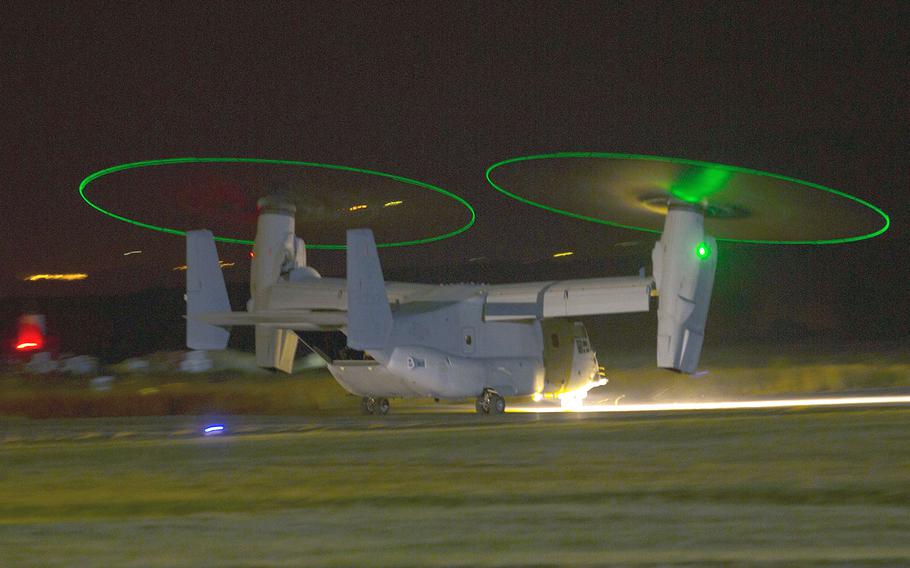
An MV-22B Osprey aircraft from Special-Purpose Marine Air-Ground Task Force Crisis Response prepares to leave Naval Air Station Sigonella, Italy, to escort approximately 150 personnel from the U.S. Embassy in Tripoli, Libya, on Saturday July 26, 2014. (Shawn Valosin/U.S. Marine Corps)
STUTTGART, Germany — The U.S. military helped evacuate on Saturday about 150 staff from the American Embassy in Tripoli, which was abandoned amid escalating militia violence.
Embassy personnel were driven to neighboring Tunisia, with U.S. F-16s, Ospreys and surveillance aircraft flying overhead to ensure security, the Defense Department said.
“All embassy personnel were relocated, including the Marine security guards who were providing security at the embassy and during the movement,” Pentagon press secretary Rear Adm. John Kirby said in a statement.
A team of crisis-response Marines forward-positioned in Sicily, Italy, were part of the evacuation effort. It was launched at 5 a.m. on Saturday and involved the movement of roughly 150 State Department personnel, the Marines said.
Some of the assets used by the Marines included Ospreys—aircraft that takes off and lands like a helicopter but flies like a plane — and KC-130J Super Hercules aircraft.
A Special Purpose Marine Air-Ground Task Force, focused on crisis response missions in Africa, is stationed at a Spanish air base in the city of Moron. However, elements of the unit are periodically positioned in southern Italy. Since May, Marines have been forward stationed at Sigonella, Italy, to ensure a speedy response should an evacuation be ordered from Libya.
Kirby said the operation was conducted at the request of the State Department.
“The mission was conducted without incident, and the entire operation lasted approximately five hours,” Kirby said.
In recent weeks, fighting between rival militias has intensified across Tripoli and Libya, where order has never been fully restored since the ouster of former strongman Moammar Gadhafi by a NATO bombing campaign three years ago.
In recent days, heavy fighting around Tripoli’s international airport has destroyed nearly two dozen parked aircraft. The capital has been carved up into militia controlled zones; the U.N. and Red Cross have withdrawn staff.
On Friday, Africa Command chief Gen. David Rodriguez spoke with concern about the deteriorating situation.
“Arms, ammunition and explosives are all over the place and provide opportunities for these violent groups to generate revenues to assert their will through violence,” Rodriguez said at his Stuttgart, Germany, headquarters.
“It will take a huge international effort, diplomatic effort, to help build a government that will serve the people,” Rodriguez said.
Following the Sept. 11, 2012, attack on a U.S. facility in Benghazi, which resulted in the death of Ambassador Christopher Stevens and three other Americans, the Obama administration has faced unrelenting criticism over its handling of security at State Department facilities in Libya.
The Spain-based Marine crisis force, formed in the wake of those attacks, was part of an effort to ensure military forces are better positioned to respond to assaults on diplomatic compounds.
State Department spokeswoman Maria Harf said the relocation of embassy staff to Tunisia was a temporary move.
“Regrettably, we had to take this step because the location of our embassy is in very close proximity to intense fighting and ongoing violence between armed Libyan factions,” Harf said in a statement. “This relocation was done over land, with our personnel arriving in Tunisia this morning, and traveling onward from there. We are grateful to the government of Tunisia for its cooperation and support.”